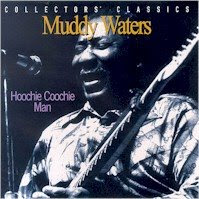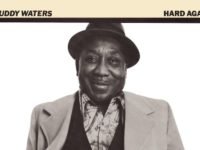NICK DERISO: Recorded live at Montreal’s Rising Sun Club in January 1977, and later reissued by Just a Memory Records in ’99, “Hoochie Coochie Man” stands as one of the last testaments to the Gospel of Muddy.
He was the bridge between country and city cool, an urban griot with Mississippi Delta dust on his boots. Along the way, Waters fired the career rockets for scores of hot-shot blues musicians, but never seemed to straggle too far away from the grounding sound and message of his art.
Featured here were a group of signature sidemen from Muddy’s final bands, including guitarists Luther “Guitar Junior” Johnson and Bob Margolin; pianist Pinetop Perkins and drummer Willie “Big Eyes” Smith.
Each added his own shading, but Waters’ genius continued to frame the proceedings.
I Want You to Love Me,” with its influential stop-start time (the same one that made the album’s Willie Dixon-penned title cut a staple), is best remembered as the initial Muddy cut to feature a pianist, Otis Spann. That sound, with the addition of “Got My Mojo Workin,'” make up the cornerstone of the Waters legend.
 But, even at this late date (just five years before his death), Muddy is willing to get outside his own familiar vernacular. The night closes, for instance, with a stomping 11-minute version of “Kansas City” — written by Leiber and Stoller, of “Hound Dog” and “Stand By Me” fame. Perkins shares lead vocals.
But, even at this late date (just five years before his death), Muddy is willing to get outside his own familiar vernacular. The night closes, for instance, with a stomping 11-minute version of “Kansas City” — written by Leiber and Stoller, of “Hound Dog” and “Stand By Me” fame. Perkins shares lead vocals.
Like the mighty brown riverway that gave him his nickname, McKinley Morganfield’s influences run across the American popular music landscape from top to bottom. You’re reminded of that, again, as he tears through “The Blues Had a Baby, and They Named It Rock and Roll” (from his “Hard Again” album of the same year, produced by Johnny Winter).
Chicago blues provided the infrastructure for rock music, and Muddy Waters was its hard-hat wearing architect.
Muddy still mixes in his familiar, but still furious slide guitar on a tribute to his principal Chicago-blues rival called “Howling Wolf.” He also delves further into the lore with “Can’t Get No Grinding,” a 1930s-era bawdy blues (originally titled “What’s the Matter with the Mill”) memorably recorded by Memphis Minnie and then Bob Wills and His Texas Playboys.
“Nine Below Zero” by Alex “Rice” Miller (also known as Sonny Boy Williamson II), Big Joe Williams’ gets-me-everytime “Baby Please Don’t Do” (embedded below) and T. Bone Walker’s “Stormy Monday” round out the set.
This dazzling, yet still intimate, session was made by the now-defunct club’s owner. That gives it a frisky, first-take heft — and the warm feel of a home recording, made with friends and sympathetic cohorts.
A must-have Muddy Waters record from outside his classic early 1950s period on Chess.
- Nick DeRiso’s Best of 2015 (Rock + Pop): Death Cab for Cutie, Joe Jackson, Toto + Others - January 18, 2016
- Nick DeRiso’s Best of 2015 (Blues, Jazz + R&B): Boz Scaggs, Gavin Harrison, Alabama Shakes - January 10, 2016
- Nick DeRiso’s Best of 2015 (Reissues + Live): John Oates, Led Zeppelin, Yes, Faces + others - January 7, 2016



